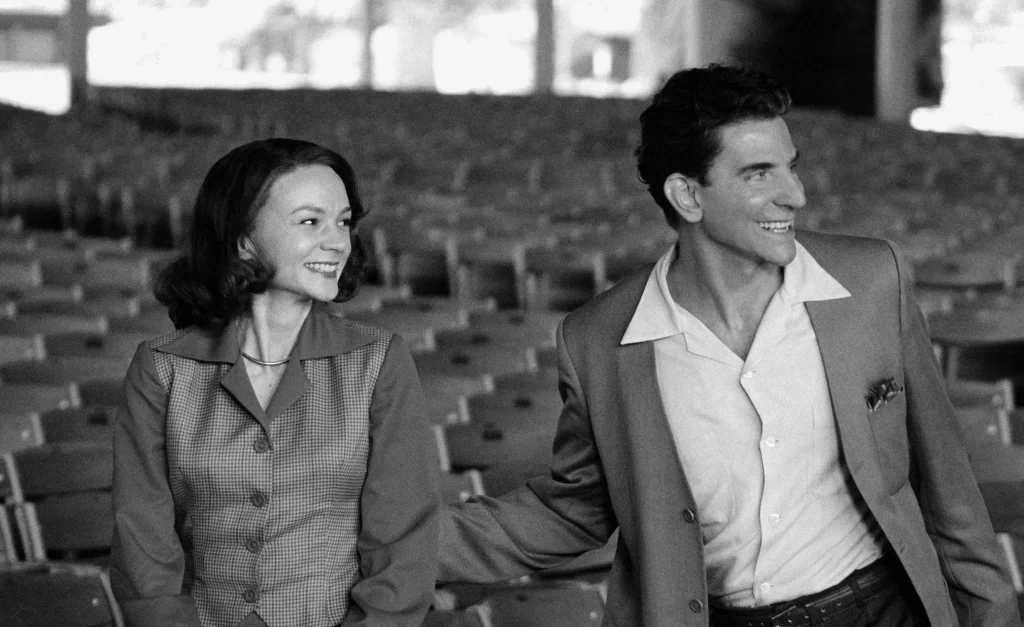
Leonard Bernstein, a widely recognized American conductor from the midcentury, is currently experiencing a notable period in his career. Following last year’s Tár, where he was hailed as a mentor and inspiration to aspiring conductors, Bernstein now takes center stage in Maestro, a biopic crafted, co-written (with Josh Singer), and starring Bradley Cooper.
The film opens with a poignant quote from Bernstein, emphasizing that a work of art doesn’t provide answers but rather stimulates questions, with its essential meaning residing in the tension between contradictory answers. Maestro’s primary focus lies in exploring the intricate tensions in Bernstein’s life, particularly the juxtaposition between his devoted marriage to actress Felicia Montealegre, which resulted in three beloved children, and his intricate sexual identity involving relationships with multiple men.
A secondary tension emerges between Bernstein’s public persona as a conductor, relishing in acclaim and self-identifying as a people person, and his identity as a composer who craves solitude for creative endeavors. Additionally, the film navigates the tension within Bernstein himself, torn between his renowned compositions for musicals like West Side Story and a desire to dedicate himself to more serious symphonic works, albeit with less widespread recognition. Felicia questions this dilemma after witnessing a captivating rehearsal of the ballet Fancy Free, prompting her to ask, “Why would you want to give this up?”
With an unwavering focus on the marital relationship, Cooper eschews many of the conventional pit stops found in traditional biopics. For those intrigued by the backgrounds of either Bernstein or Montealegre, a pivotal scene demands close attention as they withdraw to a quiet room at a party, rapidly exchanging each other’s mini-biographies. The engagement unfolds abruptly, and before we know it, four years have passed, immersing us in the family apartment where the actual Edward R. Murrow narrates Lenny’s career achievements on the soundtrack, setting the stage for a television interview.

Read: A Beginners Guide To Hollywood
A similar narrative device resurfaces later as a journalist recounts the mature Bernstein’s résumé during a pitch for a biography. Notable figures in the story receive a treatment of deliberate ambiguity, presented on a “if you know, you know” basis rather than through explicit identification.
Betty Comden and Adolph Green, collaborators with Bernstein on Wonderful Town, make a brief appearance at a party, singing a snippet of a song and engaging in exaggerated gestures, leaving unfamiliar viewers in the realm of musical theater puzzled about their identities. Choreographer Jerome Robbins, Bernstein’s partner on West Side Story and Fancy Free, is named and given the opportunity to dance briefly (skillfully performed by Michael Urie), but without prior knowledge, the audience remains uninformed.
Likewise, a bespectacled, somewhat geeky individual addressed as “Aaron” plays a duet with young Lenny, clearly an old friend who provides comfort during a family picnic. This is indeed Aaron Copland (Brian Klugman), the esteemed composer of Fanfare for the Common Man and ballets like Rodeo. While this approach, as noted by New Yorker critic Alex Ross, spares the audience from clunky exposition, such as congratulating Aaron on winning a Pulitzer Prize for ‘Appalachian Spring,’ it leaves viewers unaware of Copland’s significant role in Bernstein’s life. Their initial meeting occurred during Bernstein’s time at Harvard, where Copland became a surrogate father and the closest thing to a composition teacher. Despite occasional romantic involvement during Bernstein’s Harvard years, the film omits any indication of Felicia’s awareness or its impact on her sentiments regarding Copland’s presence at family gatherings.
Given the film’s emphasis on personal relationships, many scenes portray private conversations known only to the participants, making verification challenging. Singer, however, has started drawing inspiration from approximately 1,800 letters housed in the Leonard Bernstein Collection at the Library of Congress, unsealed in 2010, shedding light on the intricate task of distinguishing between what’s scripted and what’s improvised in Maestro.
Did Leonard Bernstein Step In as an Understudy and Return as a Star?
In the movie, a young Lenny, then serving as an assistant conductor for the New York Philharmonic, receives an early morning phone call in his apartment above Carnegie Hall. The regular conductor is unwell, and Lenny must take the stage to conduct the orchestra without any rehearsal for that afternoon’s performance. Joyously slapping his lover’s backside, he quickly dresses and rushes down to the concert hall, stepping onto the stage. The relatively unknown young conductor becomes a tremendous success, marking the launch of his career.
While the film captures the essence of the event, Bernstein was not entirely unprepared, contrary to what the movie implies. As an assistant conductor, he was tasked with being familiar with the scores of the current season, just in case he had to step in unexpectedly. Even though the orchestra wasn’t available for a rehearsal, Bernstein had the opportunity to visit the ailing Bruno Walter, the regular conductor, for some coaching. In an interview with the New York Times, Bernstein mentioned finding Mr. Walter wrapped in blankets but sitting up, obligingly demonstrating his approach. The drama made headlines, and although Bernstein conducted without a rehearsal, it was his first time leading the Philharmonic.

What About the Controversial Nose?
For those who might have missed the internet buzz in the past six months, a controversy arose when initial publicity stills for the film depicted Bradley Cooper, portraying Bernstein, with a notably large prosthetic nose. Some argued that it was a stereotypically Jewish caricature.
In reality, the prosthetic nose is approximately the same size as Bernstein’s actual nose. The challenge lies in the fact that Bernstein had a differently shaped face, and, to express a subjective view, as a young man, he was arguably more attractive than Cooper (although lacking the actor’s robust physique), causing his nose to appear differently proportioned compared to how it does on Cooper. Interestingly, the prominence of the nose diminishes once Cooper begins portraying the older Bernstein, possibly due to the balancing effect of aging makeup.
Were the Bernsteins Truly Committed to Each Other?
As Felicia (Carey Mulligan) and Lenny deepen their connection, it becomes evident that they genuinely enjoy each other’s company and share a deep bond. Lenny enthusiastically introduces Felicia to his circle of friends, and she introduces the idea of marriage, expressing, “I am willing to accept you as you are, without being a martyr. … Let’s try and see what happens if you are free to do as you like, but without guilt and confession.” Her only request is for him to be discreet and avoid embarrassing her. The relationship faces a rupture when Lenny becomes, in Felicia’s words, “sloppy” in middle age, openly engaging with a young man. This leads to their separation.
The fundamental aspects of their relationship and the agreement they struck are accurately portrayed. Bernstein was the one who proposed to Montealegre during a trip to Costa Rica. Despite not being overwhelmed by passion, it appears that he genuinely loved her, as indicated in a letter to his sister, Shirley, published in The Leonard Bernstein Letters: “Ever since I left America, she has occupied my thoughts uninterruptedly, and I have come to a fabulously clear realization of what she means—and has always meant—to me.”
In turn, shortly after their marriage, Felicia wrote to her husband acknowledging his sexual orientation: “You are a homosexual and may never change … I am willing to accept you as you are, without being a martyr or sacrificing myself on the L.B. altar. … The feelings you have for me will be clearer and easier to express—our marriage is not based on passion but on tenderness and mutual respect.”
However, the film omits crucial moments. Felicia did not marry Bernstein out of immediate passion but on the rebound. They initially met in 1947, became engaged, then broke it off. During the break, Montealegre became involved with actor Richard Hart, who, in the film, visits her dressing room while she is on Broadway. Despite being devoted to Bernstein, she had a romantic relationship with Hart, who passed away at the start of 1951. After this tragedy, she gave Bernstein another chance, leading to their second engagement and subsequent marriage in August 1951. In the interim, Bernstein had a passionate romance with an Israeli soldier, Azariah Rapoport, from 1948 to 1949.
Was Lenny Truly Embracing His Sexual Orientation?
In the film, Lenny appears to embrace his sexuality fully, stating, “The world wants us to be only one thing and I find that deplorable.” However, it seems improbable that a young Jewish man in the 1950s would have been entirely comfortable with his specific sexual preferences. While Bernstein moved in circles where being gay or bisexual was not uncommon, he was troubled enough by his inclinations to seek therapy from multiple psychoanalysts.
Bernstein and his former lover, David Oppenheim, both patients of therapist Marketa Morris, discussed their relationships and struggles with their sexual orientations. Morris expressed concern about Bernstein’s pattern of seeking relationships with men after Felicia’s departure. Actor Farley Granger, mentioned in their correspondence, was part of this dynamic, even being invited on a trip to Costa Rica where Bernstein proposed to Montealegre. Granger, aware of Bernstein’s closeness to Montealegre, maintained a respectful distance.
Another analyst Bernstein consulted, Sandor Rado, specialized in attempting to “cure” homosexuality. Bernstein, according to biographer Meryle Secrest, conveyed that he had considered homosexuality a curse and felt that marriage had saved him from a homosexual lifestyle.
The comparison between Bernstein’s marriage and the relationship of Oscar Wilde and his wife, Constance, is instructive. Both women were aware of their husbands’ same-sex relationships but remained devoted, while the men, like Bernstein, centered their emotional worlds on their families.
Leonard Bernstein, a prominent midcentury American conductor, is currently in the spotlight with the biopic Maestro. The film explores the primary tension between Bernstein’s devoted marriage to actress Felicia Montealegre and his complex sexual identity, including relationships with men. Secondary tensions involve Bernstein’s conflicting roles as a conductor who thrives on public acclaim and a composer who craves solitude, as well as the struggle between his celebrated musicals and his desire for more serious symphonic compositions. The film’s focus on the marital relationship bypasses traditional biopic elements, requiring close attention to scenes revealing their backgrounds and engagements, ultimately portraying a multifaceted exploration of Bernstein’s life.
It’s midweek, and we could all use a little boost to make it through the remainder of the workweek. No worries – the MNC Playbook is here to help! 😏 Presenting the second post of this exciting collaboration with Monkey National Company. Share your expert tips in the comments for a chance to win some fantastic merchandise…
The portrayal of various prominent figures in the narrative takes a similarly subtle approach, introducing them more on a “if you know, you know” basis rather than explicitly identifying them. Betty Comden and Adolph Green, the duo who partnered with Bernstein on Wonderful Town, make a brief appearance at a party, singing and animatedly expressing themselves, leaving those less versed in musical theater curious about these lively characters.
Choreographer Jerome Robbins, Bernstein’s collaborator on West Side Story and Fancy-Free, is named and even showcases some superb dance moves courtesy of Michael Urie. However, for those not familiar with him beforehand, there’s no additional context provided.
Likewise, there’s a spectacled, somewhat geeky individual addressed as “Aaron” who engages in a duet with young Lenny and offers consoling support during a family picnic. This character is, in fact, Aaron Copland (Brian Klugman), the distinguished composer known for works like Fanfare for the Common Man and ballets such as Rodeo.
While this approach, as noted by New Yorker critic Alex Ross, avoids cumbersome exposition like, “Hey, Aaron, congratulations on winning a Pulitzer Prize for ‘Appalachian Spring’!,” it does leave the audience unaware of the significant role Copland played in Bernstein’s life.
Their initial connection formed when Bernstein was a Harvard student, and despite Copland later dismissing his protégé’s compositions as “merely conductor’s music—eclectic in style and facile in inspiration,” Bernstein regarded him as a “surrogate father” and the “closest thing to a composition teacher.”
The film, however, remains silent on whether Felicia was aware of their occasional romantic involvement during Bernstein’s Harvard days and how it may have influenced her feelings about Copland’s presence at family gatherings.
Given the focus on personal relationships, many scenes in Maestro portray conversations known only to those involved, making verification challenging. Singer, however, has indicated drawing from around 1,800 letters donated to the Leonard Bernstein Collection at the Library of Congress, unsealed in 2010 after the composer’s 1990 demise. Despite this, distinguishing between scripted content and improvisation in Maestro remains a nuanced task.
Did Leonard Bernstein Step in as an Understudy and Emerge as a Star?
In the movie, young Lenny, then an assistant conductor at the New York Philharmonic, receives an early morning call in his apartment above Carnegie Hall: the regular conductor is unwell, and Lenny must lead the orchestra without rehearsal for that afternoon’s performance. Gleefully slapping his lover’s backside, he gets dressed and hurries to the concert hall, taking the stage as the unknown young conductor who becomes a tremendous success, launching his career.
This portrayal aligns with reality, although Bernstein wasn’t entirely unprepared, as implied in the film. As an assistant conductor, he was tasked with familiarity with the current season’s scores in case of unexpected substitutions. Despite the absence of an orchestra rehearsal, Bernstein had the opportunity to seek guidance from the regular conductor, the ailing Bruno Walter.
Recounting the experience, he shared with the New York Times, “I found Mr. Walter sitting up but wrapped in blankets, and he obligingly showed me just how he did it.” Notably, Bernstein conducted without a rehearsal, and it marked his inaugural time conducting the Philharmonic.
What About the Prosthetic Nose?
For those out of the loop in the last six months, a controversy erupted when initial publicity stills for the film featured Bradley Cooper as Bernstein sporting a noticeably large prosthetic nose. Some argued that it perpetuated Jewish stereotypes and resembled a caricature.
In reality, the prosthetic nose is approximately the same size as Bernstein’s authentic nose. However, the discrepancy lies in the distinct shape of Bernstein’s face. To offer a subjective viewpoint, as a young man, he was arguably more attractive than Cooper, despite lacking the actor’s robust physique. Consequently, Bernstein’s nose didn’t appear disproportionate as it does on Cooper. Curiously, the nose’s prominence diminishes as Cooper portrays the older Bernstein, potentially due to the balancing effect of aging makeup.
As Felicia (Carey Mulligan) and Lenny grow closer, their genuine enjoyment of each other’s company becomes evident, marking them as soulmates. Mulligan’s character introduces the prospect of marriage, expressing a willingness to accept Lenny as he is, free from guilt and confession.
Her only request is for discretion to avoid embarrassment. However, when Lenny becomes what Felicia terms “sloppy” in middle age, publicly engaging with a younger man, she decides to end their relationship.
The fundamental aspects of their relationship and the associated agreement portrayed in the film are accurate. Remarkably, it was Bernstein who proposed to Montealegre during a Costa Rica trip. Despite not being overwhelmed by passion, it appears he genuinely loved her, as indicated in a letter to his sister, Shirley, published in The Leonard Bernstein Letters. The letter reveals his continuous thoughts about Felicia and a clear realization of her significance in his life.
Yet, the film omits crucial moments. Montealegre did not succumb to a whirlwind romance but married Bernstein on the rebound. After meeting in 1947 and briefly getting engaged, they separated. Montealegre then became involved with actor Richard Hart. Following Hart’s death in early 1951, she gave Bernstein another chance, leading to a second engagement in August 1951 and marriage a month later. Meanwhile, Bernstein had a passionate romance with Israeli soldier Azariah Rapoport from 1948 to 1949.
Regarding Lenny’s acceptance of his sexual orientation in the film, he seemingly embraces himself fully, expressing discontent with societal expectations. However, it appears unlikely that a young Jewish man in the 1950s would have been entirely comfortable with his specific sexual preferences. While the circles Bernstein frequented acknowledged homosexuality and bisexuality, the film simplifies his acceptance, overlooking the internal conflicts he faced.
Distressed by his preferences, Bernstein sought solace with multiple psychoanalysts, a trend quite common among affluent Manhattanites in the 1950s. Alongside his former lover David Oppenheim, who had been married three times and fathered several children, Bernstein consulted therapist Marketa Morris, known as “the Frau” in their correspondence.
In a letter to Bernstein, Morris observed, “You are seeing Felicia, and the day she leaves, you have to see a boy. The same old pattern. You can’t give up.” This “boy” was actor Farley Granger, not referenced in Maestro. Granger, aware of Bernstein’s proximity to Montealegre, conveyed in a letter, “I am having dinner with Felicia tonight. She is a great girl, and I’m sure loves you very much.” Bernstein even invited Granger on the Costa Rica trip where he proposed to Montealegre, but the actor, displaying a better sense of boundaries, declined.
Drawing a parallel, it’s insightful to compare the Bernstein-Montealegre marriage to that of Oscar Wilde and his wife, Constance. Despite knowing of Wilde’s dalliances with young men, Constance remained devoted, much like Bernstein prioritized Montealegre and their children emotionally.
Beyond the film’s debut scene, Maestro scarcely acknowledges Felicia’s most significant rival and Bernstein’s true love—approximately 90 men comprising the New York Philharmonic, an all-male ensemble until 1966.
Serving as music director from 1958 to 1969, Bernstein led the orchestra in more concerts than any previous conductor. Even after stepping down, he retained the lifetime title of laureate conductor and frequently guest-conducted. Declining to extend his contract, Bernstein expressed, “I shall always regard the Philharmonic as ‘my’ orchestra.”
The affection was mutual.
A 2023 New York Times article notes that, following the announcement of Gustavo Dudamel succeeding Jaap van Zweden as conductor, there’s a palpable desire within the Philharmonic for a reprise of Bernstein’s era in the 1960s—the true glory days of the nation’s oldest orchestra.
Before you go, do check out some of our amazing web stories below.
Related posts:
- 5 Signs, She Is Not Into You
- 7 Cool and Unique Ideas for Couples’ Wedding Tattoos
- Why Successful and Lonely Businessmen Use Dating Apps
- Singer Celine Dion’s Strange Reaction While Singing in Kate Winslet’s Titanic
- The Ultimate Guide to Travel Hacks for Budget Explorers
- The Marvels Post-Credits Scene, Decoded











